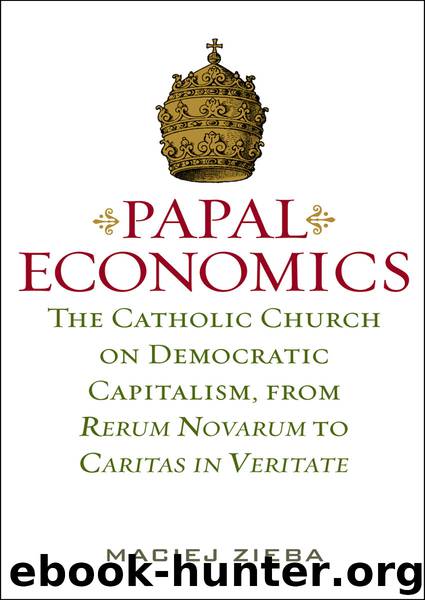Papal Economics: The Catholic Church on Democratic Capitalism, from Rerum Novarum to Caritas in Veritate by Zięba Maciej

Author:Zięba, Maciej
Language: eng
Format: epub
Publisher: ISI Books
THE PRECURSORS OF CENTESIMUS ANNUS
After the Second World War, Germany was a ruined nation. As one witness of the postwar period aptly noted, almost no one in 1945 could have predicted that the German economy would not only recover but would in two decades' time become one of the world's strongest.
The remarkable rebuilding effort resulted from the creative cooperation of a broad group of thinkers—distinguished economic theorists (chief among them Walter Eucken), lawyers (such as Franz Böhm), economists who were also historians and philosophers (especially Wilhelm Röpke, the main author of the Ordoliberal theoretical program, as well as Alexander Rüstow), and economists who turned out to be illustrious politicians (including Minister of Economics—and later Chancellor—Ludwig Erhard and his adviser Alfred Müller-Armack). The breadth of knowledge and experience produced an accurate, multidimensional analysis of the causes of the capitalist crisis and a successful model for rebuilding economic life—one founded on a Christian anthropology and metaphysics. Contemporary German economist Theo Weigel wrote on the hundredth anniversary of Erhard's birth, “The social market economy is thus, ultimately, a successful synthesis between liberal concepts ruling politics and the social principles of Catholic social teaching.”
Based on these principles, the Ordoliberal criticism of capitalism acquired a spiritual dimension and was, in its depth, much more original—and, as it turned out, more effective—than John Maynard Keynes's prescription, which reacted more to the consequences of crises than to their causes. According to the Ordoliberals, Keynes's theories led Europe into sustained inflation and economic and social chaos after World War II,.
Ordoliberal thinkers operated on the basic principle that the spiritual dimension of human life cannot be ignored and therefore neither can the transcendent dignity of each person. In their view, the key failure of nineteenth-century liberalism lay in overlooking these vital elements. In A Humane Economy, Röpke writes: “The ultimate source of our civilization's disease is the spiritual and religious crisis which has overtaken all of us and which each must master for himself. Above all, man is Homo religiosus, and yet we have, for the past century, made the desperate attempt to get along without God, and in the place of God we have set up the cult of man, his profane or even ungodly science and art, his technical achievements, and his State.”51 According to the Ordoliberal critique, the Enlightenment influence on nineteenth-century culture included too much Rousseau and Voltaire and not enough Montesquieu.
This debate with Enlightenment thinking is reflected in the very name of the Ordoliberals. For Enlightenment thinkers, the ideal was l'ordre naturel—a spontaneous order in which rational and enlightened individuals acted in all areas of life. For the Ordoliberals, by contrast, the ideal was the ordo universi—the order of the universe, the idea that there was a natural order designed by God and directed by men. They had taken the idea from Thomas Aquinas, to whom they often referred. According to Franz Böhm, one of Walter Eucken's closest collaborators, there is only one system that deserves to be called an “order” in a higher sense: the created order of the universe.
Download
This site does not store any files on its server. We only index and link to content provided by other sites. Please contact the content providers to delete copyright contents if any and email us, we'll remove relevant links or contents immediately.
Resisting Happiness by Matthew Kelly(3197)
The Social Psychology of Inequality by Unknown(2768)
Designing Your Life by Bill Burnett(2603)
Day by Elie Wiesel(2594)
The Giving Tree by Shel Silverstein(2174)
Angels of God: The Bible, the Church and the Heavenly Hosts by Mike Aquilina(1870)
Human Design by Chetan Parkyn(1859)
The Supreme Gift by Paulo Coelho(1797)
Jesus of Nazareth by Joseph Ratzinger(1708)
Augustine: Conversions to Confessions by Robin Lane Fox(1686)
Hostage to the Devil by Malachi Martin(1676)
7 Secrets of Divine Mercy by Vinny Flynn(1620)
Dark Mysteries of the Vatican by H. Paul Jeffers(1606)
The Vatican Pimpernel by Brian Fleming(1586)
St. Thomas Aquinas by G. K. Chesterton(1557)
Saints & Angels by Doreen Virtue(1530)
The Ratline by Philippe Sands(1425)
My Daily Catholic Bible, NABRE by Thigpen Edited by Dr. Paul(1414)
Called to Life by Jacques Philippe(1410)
